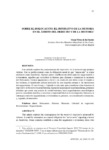Sobre el Holocausto: el imperativo de la memoria en el ámbito del Derecho y de la historia

Ver/
Use este enlace para citar
http://hdl.handle.net/2183/8306Coleccións
Metadatos
Mostrar o rexistro completo do ítemTítulo
Sobre el Holocausto: el imperativo de la memoria en el ámbito del Derecho y de la historiaAutor(es)
Data
2010Cita bibliográfica
Anuario da Facultade de Dereito da Universidade da Coruña, 2010, 14: 91-119. ISSN: 1138-039X
Resumo
[Resumen] Este artículo explora las consecuencias del imperativo de la memoria que propuso Adorno. Este se podría resumir como la obligación moral de que “nunca más” se repita un horror como Auschwitz. Algunos países establecen un delito para los negacionistas o revisionistas, aquellos que reescriben la historia para eliminar o minimizar la memoria del Holocausto. Existen argumentos a favor y en contra de este delito como el respeto a las víctimas, el significado cultural particular de una tragedia europea o las intenciones del negacionista. El caso Irving v. Lipstadt es relevante para considerar cómo funciona el imperativo de la memoriaen la Historia. A pesar de las perspectivas postmodernas, podemos defender que existe una noción de verdad histórica, unos requerimientos metodológicos para la comunidad científica y una ética y responsabilidad en la investigación. Entonces, la estrategia contra los negacionistas y revisionistas es, primero, no considerarlos seriamente, y, segundo, denunciarlos. [Abstract] This article explores the consequences for the memory’s imperative proposed by Adorno. It could be summarize as a moral obligation for “never more” repeating a horror as Auschwitz. Some countries establish a crime for negationist o revisionist, those who rewrite the history for eliminating or minimizing the memory of the Holocaust. There are arguments for and against this crime as the respect for the victims, the particular cultural meaning of a European tragedy or the intentions of the negationist. The case Irving v. Lipstadt is relevant for considering the memory’s imperative in History. Although postmodern perspectives, we can defend there is a notion of historical truth, methodological requirements for the scientific community and ethics and responsibility in investigation. Then, the strategy against the negationists and the revisionists is, first, not consider them seriously and, second, denounce them
Palabras chave
Holocausto
Historia
Memoria
Libertad de expresión
Revisionismo
Negacionismo
Holocaust
Free speech
Reviosinism
Negationism
Historia
Memoria
Libertad de expresión
Revisionismo
Negacionismo
Holocaust
Free speech
Reviosinism
Negationism
ISSN
1138-039X





